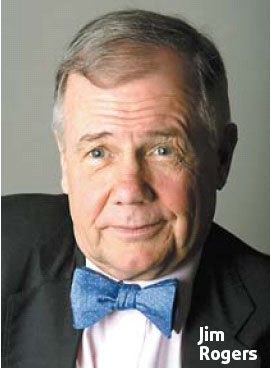

2008 is an uneasy time for China's stock investors, with the market's wild fluctuations beating most analysts' expectation. After the benchmark Shanghai Composite Index peaked at 6,124 points in mid-October of 2007, it nosedived to 2,990 points on April 22, the lowest point in the past 12 months.
While the big drop frightened many individual investors, it also provided a prime buying opportunity for long-term investors.

For more stories behind the huge swing in the capital market, China Business Weekly reporter Hu Yuanyuan talks with the American investment guru Jim Rogers, chairman of Rogers Holdings and co-founder of the Quantum Hedge Fund with George Soros.
Q: What do you think of the plummet China's stock market seen in the past few months? What is the major trigger for this slump? Is that a rational correction?
A: Some stocks in China's market were highly overpriced originally and this big drop helped squeeze these bubbles. Since last year, the Chinese government has been trying to cool the property market and stocks, introducing a series of tightening measures including higher interest rates and bank reserve ratios. The moves did lower the asset prices and adjust the stock markets.
In fact, the ups and downs in the stock market are naturally the way operates.
Q: As you have mentioned before, you would like to keep Chinese shares for a lifetime. Did you sell any Chinese shares in the past few months or have you remained faithful to your belief? Could you disclose a general proportion of China-related stocks in your whole investment portfolio?
A: Yes, I still believe the renminbi is the safest investment in the world and I have not sold any Chinese-related shares so far. On the contrast, the recent correction in A-shares and H-shares markets has provided a unique opportunity to buy.
I started to buy the Chinese mainland-related stocks in Hong Kong and Singapore in the past few weeks, but not so many. I will buy more if there is a more substantial decline or more panic, And I am even more optimistic about Taiwan stocks, given its great potential because of the cooperation across the Straits
As for the proportion, I couldn't reveal it because actually I don't know it by myself.
Q: Among your stock pool, which are particularly appealing to you? You are also quite optimistic about the investment potential in commodities, aren't you?
A: Water treatment, agriculture, power generation and tourism will be good choices.
As inventories of food remain low and prices continue to rise, commodities are also a safe haven for investors, especially agricultural and energy commodities.
Despite the climbing commodity prices, they are still well below the all-time record. Oil, for instance, may rise above $150 someday.
Q: China's stocks skyrocketed more than 9 percent after the government slashed the stamp tax on stock trading from 0.3 percent to 0.1 percent, meeting most investors' expectations for the government to "save" the market. According to you, what kind of role should the government play in the capital market?
A: The government could do more to curb inflation and prevent the economy from overheating as the Chinese government is striving to do. But it had better stay out of the market as it has its own way of operating.
The big jump on April 24 has some relation with the reduced stamp tax, showing the government's concern in boosting the market. But the stamp tax is not the real reason for the plummet or rise of the market.
(China Daily 05/03/2008 page3)













